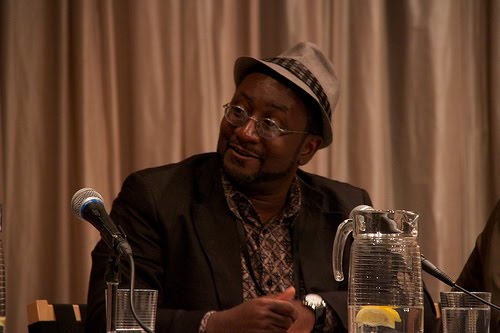"Preston, I read in your bio that you hold an MFA and that you have taught creative writing. What is your favorite creative writing exercise? What is the most valuable thing you learned in your MFA program? How did you get the idea to write ALL OR NOTHING? Thanks, a writing student."
Good questions all. I'll handle them in reverse order.
1. I got the impulse to write ALL OR NOTHING because of my experiences in the casino and GA. I write to understand that which I do not understand. I did not understand the tragic things I was witnessing. There was a particular tragedy that I was somewhat close to . . . I myself was almost a tragic statistic. There was a time when I believed that I could not be helped, and it scared me. I opened my mouth to say all this and P's voice came out. At first, I thought that he would speak a short story, then a novella--before I knew it, he had spoken a novel. He had much to say. It is one of two novels I have written from beginning to end in a burst (the other is IMAJ, which is now entitled COME WITH ME, SHEBA). The editing was difficult because even those parts that were removed to improve the book are worthy and true. The book was originally written so that the chapters could be read in any order. Then I met Missy, and put her in the book, and she gave it order.
2. The most valuable lesson I learned in the MFA program is how to tell a story. Beginning, middle, end--it sounds so simple, but I was one of many who did not know what a story was, though from time to time I accidentally told one. I was very artsy before the MFA program--I wanted to impress with words. Now I am more interested in impressing with story. No matter how beautiful be your prose, it is story that the reader remembers. The reader returns to his/her favorite book, for story, not for seamless prose.
I am often a harsh critic of some of the lurid, poorly written works I find on bookstore shelves these days, but to their credit, these novels sell because of one thing: they tell a story (however badly). Here is something to keep in mind, dear writing student--long before the printed word, there was the "Storyteller." We artsy ones often get so caught up in the WAY we tell a story that we forget to actually TELL a story.
Truth be told, I still find it necessary to write short stories that are not really "stories" from time to time because of their other worthy characteristics--such is the nature of the short story, as the prettiness of its writing allows it to hover somewhere between prose and poetry. In fact, some of my favorite short stories are not really "stories": "Orientation" by Daniel Orozco, "Girl" by Jamaica Kincaid, and Italo Calvino's pieces in the venerable masterpiece INVISIBLE CITIES. That is the way it is with short stories from time to time. With my novels, however, I always tell a story. Why else would my reader read all the way to page 300 if not to find out how it all ends? He/she certainly would not read all that way because of my pretty sentences.
3. Two exercises
The End is the Beginning. (plot builder)
Go to a train station or some other public place and watch people. Take notes as you do: the sensory things--the smells, the sounds, the sights. When you find an interesting person (or persons) doing something interesting (or not so interesting--if the homeless man stretches out to sleep on the bench, if the lady in the smart dress kisses her poodle on the nose, if the man in the suit lights a cigarette and smiles), see this as the end of your story. Now write towards this end.
The Hero With No Name. (description, narrative voice)
Set your story in an unremarkable place (at home, at work, train station, grocery store check out lane, bus stop) and people it with normal people doing normal things, except one character who refuses, politely, to state his/her name. You may describe him/her but are not permitted to state the name, and he/she never states the name even in dialogue. Set the story in the third person.

No comments:
Post a Comment